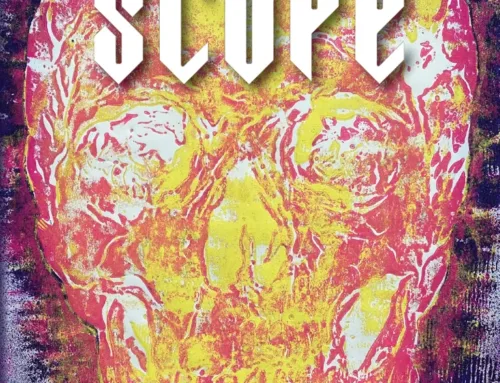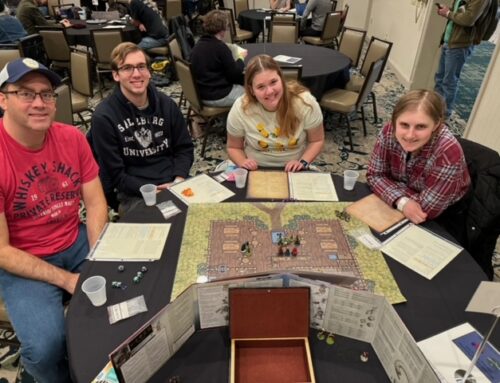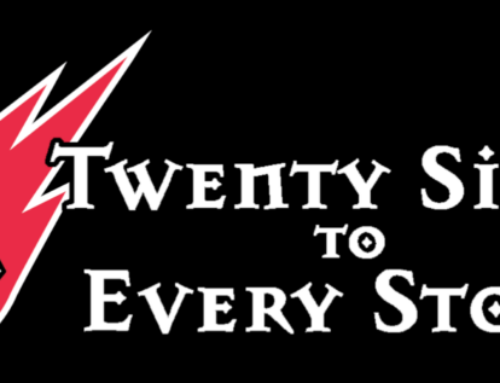In an earlier post, I defined a dabbler as someone who has yet to write one million words while simultaneously implying that the one million words benchmark might be less of a milestone than a state of mind.
Undoubtedly, there are dabblers out there who have surpassed two million words, and there are days that I envy them.
Back in my dabbler days—while a high school student, specifically—I had the great fortune to not only meet, but also hang out with a slew of successful sword-and-sorcery authors, including Margaret Weis, Don Perrin, Jeff Grubb, Kate Novak and others. As an avid fan of the Dragonlance novels, it was more than a little surreal to spend time with the talented writers whose books were being enjoyed by millions of readers around the world.
I’m not sure what those established authors thought of the boy with no shortage of questions about the craft and business of writing, and, sadly, I don’t recall much of the conversations. However, one sentiment has remained in my gray matter these past sixteen or so years.
At some point in the afternoon, one of the writer said the downside to being a published author is that she always felt compelled to put forth her best effort and that she could no longer write “just for fun” anymore.
I remember thinking, “Now there’s a problem I’d like to have.” Even then, as a dabbler whose narratives took the form of an endless series of scenes featuring hundreds of characters storylines, I recognized that when one decided to buckle down and craft a true novel with actual chapters, a limited cast of characters, a grand story arc, and maybe a subplot or two, the professional novelist needed to consider every word’s impact on the audience.
Transitioning from a dabbler to the next stage—a would-be professional writer or a not-yet-published novelist or, let’s be frank, a wannabe—requires a fundamental shift in attitude and behavior. If a hobby is to become a vocation, one needs discipline and dedication, a big step beyond simply answering to your own literary whims.
In that instance, a stress-reliever becomes a source of stress.
According to psychology, there are two types of stress: eustress and distress. The former is a positive force that can motivate an individual to achieve. It brings with it a sense of satisfaction. The latter, of course, is a destructive power that takes a toll. As a young wannabe, I eagerly tapped into eustress, channeling it and letting it fuel me as I wrote my first novel.
And the next one.
And the next one.
And, possibly, the one after that.
But not so much anymore. Even though I promised myself that I wouldn’t let the road to becoming a professional writer leech the fun out of writing, I realize now that that is exactly what has been happening over the years. It’s not simply because I hold myself to very high standard when it comes to my fiction (though that plays a big part). As a matter of fact, I make it a point to engage in “nonproductive” writing when I’m in between novels—short stories that I write just for the joy of creation and with no intention of publishing or even editing them.
Don’t get me wrong. I still take a lot of satisfaction out of the craft of writing. Yet somewhere along the journey, I’ve succumbed to the most sobering aspects of professional writing without the bright side of seeing any of my projects in print. I tackled my latest manuscripts with all of the seriousness of a professional writer, taking every step I can think of to ensure artistic integrity and commercial appeal of the work. In a sense, I’ve become a slave to my fiction, sacrificing countless hours of sleep, family time, and time I could have been pursuing other pastimes.
In short, I’ve done everything imaginable to get to the finish line, and yet publication remains ever out of the reach.
I’m sure the other wannabes out there can empathize with my plight. Perhaps it’s only natural that a certain amount of bitterness will creep in after a writer pens five novels only to realize that the first four aren’t good enough to attract an agent and the fifth novel, while good enough to be represented by an agent and good enough to be considered by a major publishing house, still hasn’t been purchased after going on two years because of so much uncertainty in the industry.
I might even sound ungrateful to the dabblers and other wannabes out there. After all, I’m fortune enough to have a regular writing gig as a freelance columnist for the local newspaper. I have a fulltime job at an ad agency and get paid to write marketing copy, commercial scripts, blog posts and so forth. And I have a great agent and an editor, both of whom are pushing for the sale in spite of the current quagmire. I could get a phone call tomorrow with the good news.
Or the bad news.
And where would that leave me? Back at square one as far as my fiction goes. I am a writer. But I want to be a novelist—a published novelist. Fiction is my first love, and while I’ve been very blessed to find other outlets for my writing skills, I can’t help but feel like a failure when I consider how much time and energy I’ve invested in fiction without any return on investment up to this point. Arguably, too much of my identity is tied into my fiction writing. It’s not enough for me to know that I’m a good writer; I crave the validation in the form of a signed contract by a publishing house.
It occurs to me that my preoccupation with getting published is unhealthy—not only because I’ve lost some enjoyment and enthusiasm for the process of writing itself, but also because there’s this other area of my existence called Real Life, and it, too, has paid a price while I’ve been on this decades-long quest.
Setting the actual fiction writing and editing commitment aside for a moment, consider that while this publisher has been pondering the purchase of my MS (If Souls Can Sleep), I have pursued other avenues in support of my dream, including setting up this author’s website and updating the blog herein. I have three distinct venues for writing creative nonfiction: this blog, the ad agency website blog, and my lifestyle column. When working solely on fiction, I would routinely have thoughts that sparked a “what if” storyline; I’d file it away somewhere for a future project. When I started my newspaper column, I began doing the same thing, thinking, “That might make a good column topic.”
Now that I contribute to two blogs as well, it’s gotten much, much worse. Just about any thought I have now passes through a filter:
- Could this be used in my fiction somehow?
- Could I write a column about it?
- Is it writing-related and suitable for my author’s blog?
- Is it marketing/communications/website-related and suitable for the agency blog?
As if planning for and then plotting out these different forms of writing weren’t exhausting enough, there’s still another step before all is said and done: promoting it. With a background in public relations and marketing, I am well aware of the myriad delivery systems and channels available. I’ve started following other blogs so that I can network and, when it’s not too tacky, link back to one of my posts. I started a Facebook and Twitter account for One Million Words, which is in itself a form of personal branding. My agent lent me a book about guerilla marketing for writers, and I’m scared to open it up because I can’t keep up with all of the tactics I’m tentatively trying, let alone new ones.
The insanely aggressive writing-related schedule I came up with is unsustainable in no small part because even when I step away from my writing and am in Real Life, I can’t stop thinking about what I am going blog about next, what I should be doing to get more readers for this blog, and how on God’s green earth am I going to fit fiction back into the mix when I start working on the editing my current MS.
And didn’t I decide against self-publishing and to work through an agent with a publishing house instead so that I didn’t have to get bogged down in the business side of writing?
In case it’s not already obvious, I tend to be an overachiever. I’m not just a Type A personality; I’m Type A+. Though I’m a recovering perfectionist, I still suffer from a chronic addiction to measurable progress. If there’s something else I can do to ensure my success, I’ll do it…even begrudgingly.
R.A. Salvatore, another fantasy author I’ve had the good fortune to meet (though our conversation lasted only as long as it took him to sign an autograph), claims the only way a person can know if he or she is a writer is to quit. If you can quit, then you’re not a writer. If you can’t quit, congratulations…you’re a true writer.
That sounds an awful lot like an addiction to me.
I’m pretty sure I was an addict even back in my dabbler days, but it’s only gotten worse while in the wannabe stage. These past 20 months, while waiting for an answer from a publisher, I’ve overcompensated for having no control by trying to assume as much control over my fate as a hopefully-soon-to-be-published author as possible. Apparently, getting a book published is no longer enough; I need to get everything in place so that when my novel hits store shelves, I’ll have the groundwork for having everything a real author needs to be successful.
All of which has me yearning for those simpler times when I wrote just because telling stories was fun.
Once I took pride in being a fiction writing addict. It meant I had “the stuff.” These days, however, I’m starting to wonder if any addiction—including something that started out as being constructive—can be healthy. With my head filled with a frenzied miasma of thoughts about writing (i.e., obsession) and my free time crammed with writing and writer-related activities (i.e., compulsion), the whole shebang starts to feel like a big withdrawal from Real Life. When I’m productive, I’m happy. When I feel as though I’m making progress, I’m happy. When Real Life gets in my way? Not so much.
Since something has to give (and hopefully not my sanity), my thoughts drift back to the dabbler days, about the motivation that spurred me on this road to wannabe and, God willing, to the real deal eventually. Back then, I wrote because I had stories in me that I had to get on paper, and I had one loyal reader: a good friend who today is my wife. (And without her early support, I might not be in this pickle now! Just kidding…)
My freshman year of college, I took the blind leap from dabbler to wannabe. I started my first novel, writing a chapter a week and working with an English professor, who helped me avoid the types of mistakes that seem so obvious now. But why did I become an English major? What made me decide to dream of becoming a published author?
It wasn’t the money, though who wouldn’t want to get compensated for doing what he loves? It wasn’t fame because at heart I’m an introvert. Yes, I’d like to have a small following—fans who look forward to the release of a new David Michael Williams novel—but more than anything, I wanted more than just one other person on this planet who appreciates the work I put into my fiction.
In my naïveté, I made a goal to be published by the age of twenty-three. (Are you done laughing yet? OK, I’ll wait.)
Ten years after that deadline has come and gone, I still have zero books published. A lot has changed in that time. Vanity presses, once the tacky badge of an amateur (a wannabe who wants to be published so badly he or she is willing to pay for it), have evolved into e-publishing. Anyone can get his or her fiction uploaded to a website in a matter of minutes. If my sole goal was to get my novels into the hands of readers, there’s really nothing stopping me.
Which means that prestige is more important to me than I care to believe or I need an objective expert in the industry to confirm my desperate hope that my writing is worthy of publishing. Maybe it’s a little of both.
Yes, I want to be “discovered.” I want those with keen eyes (and a healthy budget) to reward me for my endeavors. Even though I live in a DIY era, I don’t want to have to figure everything out for myself. I don’t want to hunt for cover art or peddle my wares like a desperate blog-to-blog salesman. All that takes time away from what I really want to be doing: the writing. And gosh darn it, I want people to be able to flip through the pages of my novel, not just download a digital copy.
So, yeah, I guess I’m kind of picky.
The good news is there’s a decent chance a major publisher will buy If Souls Can Sleep. Then the dream becomes a reality. Then I’ll be happy. Right?
Probably not—at least not if I let my personality (A+, remember) have its way. Clearly, I’ve lost my way from the optimistic dabbler…that dope who was happy with just churning out stories. My motivations need a readjustment. Writing, in moderation, should be enough. Getting published should be a happy coincident. It’s about the art, not adoring fans; the creative thrill, not the cash.
So I’m tossing out my writing schedule. I will continue to set aside time to write and edit fiction regularly. My newspaper column has been rewarding, not to mention the only legit publishing credit I have. I’d be an idiot to abandon it. I plan to contribute as the spirit moves me. That has served me well in the past.
For now, I’m done tinkering with this website. I’m unsubscribing to the various and sundry blogs I’ve been reading (some people post daily?!). No offense intended, fellow writers. As for Facebook and Twitter, I’ve had enough.
I rescind the promise I made to myself to update this blog weekly. The sad thing is I really enjoy writing about writing. I just don’t have the time. It’s beyond the focus of my dream. And there’s too much pressure (self-imposed stress) to write something profound, something of value to the greater world, and something that will somehow give me “street cred” in the arena of fiction writing.
Starting with this post—with its unwieldy headline, dull lead, lack of subheads, and a length that any strategic marketer would have chopped into eight distinct installments—I’m not going to waste time shaping an image or paving the way for professional networking. If I feel the need to write about writing, I might post it here. Or not. I won’t commit to anything.
Fewer nonfiction obligations will mean fewer distractions from my fiction and fewer intrusions into Real Life. Filling my time with more and more activity hasn’t made me a better writer or a happier person. I’m ready to set aside my quixotic quest for “publication or bust” and embrace moderation and balance.
No one wants to be a wannabe. But I’d rather be a content wannabe than a published author who has lost sight of what’s truly important.



Hey, David,
Serious stuff here. I read all of it.
Perhaps you are right to fall back a bit. But not completely. There are lifetime priorities that must be honored–kids,a lovely, helpful, believing wife. Maybe even friends.
The guy who said if you can give up regular writing regimens, you were never meant to be a writer is correct.
I recall my guilt feelings when I didn’t write a couple thousand words a week–this even while I was a full-time teacher. (My summer months saw a flood of writing.) And as husband/father. I actually hated myself for this lapse.
Now in my waning years, that compulsion is not prominent. I’ve made my mark; I’ve been published to death. And if the world can’t recognize my genius by now, well (expletive deleted) them!
I made money, I supported my family, I built homes, I invested. All as result of my final entry into full time writing.
I HAVE achieved. Now give it a rest. So I now doodle, hoping that something might come of it. But I don’t get frantic about it.
At your stage, David, set some reasonable writing limits. You CANNOT abandon family, employment, sanity for this driving ambition of yours.
So. Good choice. Stick with it.
Words of wisdom for the day.
From the grey pornographer.
TOM
Ooops! Forgot. I have often suggested you try writing in a different genre–like Updike, MacDonald, Wolfe do. Our mundane lives contain many mysteries. And plot lines. Perhaps you should give it a try. You are certainly old enough to cash in on your perspective/s. That China thing alone is worthy of a novel. Take your brain out for a spin!
Thanks, Tom. As for your post script, I might just take a break from the speculative fiction and try my hand at something more mundane/less magical and reflective of real life. I’m only 33, after all. I have the rest of my life to dabble in other genres, including “nongenre fiction.”